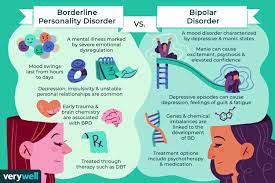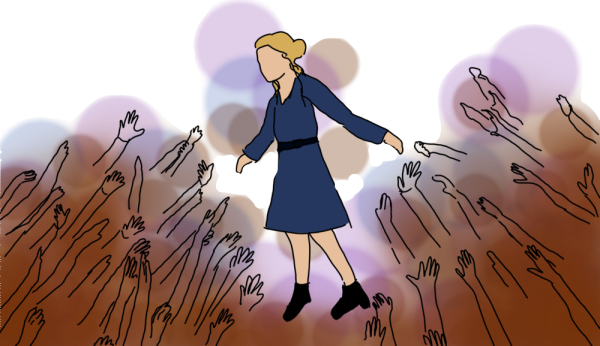Bipolar/Borderline Personality Disorder – How Can We Help?

Intense mood swings, feelings of hopelessness and emptiness, extreme highs and lows, feeling worthless, dangerous impulsivity… These are all symptoms of two of the most dangerous mental disorders a person can have. Bipolar disorder and borderline personality disorder. What is bipolar? Bipolar is a mood disorder that is characterized by intense highs (mania/hypomania) and intense lows (depression) as well as extreme anger issues and emotional dysregulation. What is borderline? Borderline is a personality disorder characterized by emotional dysregulation, suicidal and self harm tendencies, and a major fear of abandonment. The risk of suicide and self harm is incredibly high in both disorders. About 25-50% of people with bipolar attempt suicide and about 15% of them die by suicide. Also, around 73% of people with borderline have about three suicide attempts, and around 9% of them will actually die by suicide. In addition, what makes these disorders so terrible to live with is the fact that they are usually developed through severe trauma. Bipolar is more commonly developed through genetics, and so can borderline, but they will commonly be developed through terrible life experiences as well.
First of all, what are the symptoms of each disorder? The basics of borderline is that the symptoms include emotional instability and dysregulation, mood swings, impulsivity, risk-taking behaviors, self harm, suicidal tendencies, fear of abandonment, rage issues, periods of euphoria, unstable relationships, depression, feelings of insecurity and grandiosity, and an unstable sense of self. Some other symptoms according to the, DSM-5, include paranoia, psychosis, eating disorders, anxiety, panic attacks, and substance abuse. For bipolar, the core symptoms include manic/hypomanic episodes, depressive episodes, mood swings, suicidal thoughts, self harm tendencies, irritability, anger issues, delusion, and lack of concentration. Some other symptoms are disinhibition, grandiosity, increased productivity, and frenzied speech. What are manic/hypomanic episodes? A manic/hypomanic episode is an episode that causes the person to feel extremely euphoric and happy, invincible, and have high self esteem. The person may have a lacking need for sleep as well as impulsive behaviors like excess money spending, excess eating, increased sex drive, excessive productivity, racing thoughts, and very fast speaking patterns. In a depressive episode, a person may feel guilty, worthless, sad, irritable, slow, they could lose interest in things, gain or lose weight, and sleep a lot more or a lot less. The most important thing to note about these disorders is that they are extreme. Anyone can experience some symptoms of them without actually having the disorder. A person should see someone when the symptoms start racking up a lot and it’s interfering with your school and home life as well as your relationships and sense of self.
What is the stigma around these disorders? Both of these disorders cause anger issues, and when a person is untreated or doesn’t know how to deal with their anger, it can often make the person say and do bad things. Of course, a person with bipolar or borderline isn’t inherently bad, but sometimes their symptoms can make them do and say bad things if they can’t control themselves. What this does is it creates an antagonistic stigma around the disorders. A lot of the time, therapists and psychiatrists refuse to deal with a patient with one of these disorders, and a lot of people may avoid them or tell them to “grow up” and “just control yourself.” However, what they don’t know is that when you’re struggling with one of these disorders, especially untreated, it is really, really, really hard to control. It’s debilitating. But the most important thing to note is that these disorders do not make someone a bad person.
What to do if someone in our school is struggling with one of these disorders? Well, we have plenty of school assistance counselors and guidance counselors. There is Mrs. Kelly, for example. She is a guidance counselor here at Hunterdon Central. When asked the question: “If a student came to you saying they had this disorder and were struggling, how would you help? What advice would you give?” she gave the response: “I would be supportive. I would ask how their diagnosis impacts them in the classroom and what, if any, support they need from the school. Would they want me to communicate that information to their teachers? Do their doctor(s) have any suggestions on how to best support them? I could introduce the idea of a 504, explain the process of requesting a plan, etc.” This is a perfect example of how we can help, especially as a school of supportive and wonderful people. These counselors are trained to deal with these kinds of situations, and they should be fully prepared to listen and help. For example, Mrs. Edgar, a student assistance counselor, stated that she would educate the student on their disorder, separating them from their symptoms and learning how it impacts their daily life. She said she would also use cognitive behavioral therapy methods as well as talking them through their problems. In addition, she stated “Also, I think it is important to not let a diagnosis completely define who we are. This is true again for any diagnosis, it is a piece of who we are, not the complete picture.” Like previously stated, these counselors know how to help. They are incredibly kind, knowledgeable, and supportive. Their aide can help a student deal with their problems and can make their life just that much easier.
Bipolar disorder and borderline personality disorder are two of the most debilitating disorders to live with. With the extreme highs and lows, black and white thinking, and anger… It can create a very unstable person. However, with the right help, especially from people in our school, they can be treated and learn to manage their disorder. They can live a fulfilling life.










